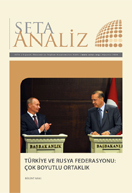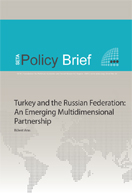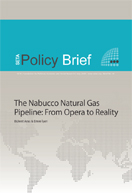Bülent Aras
Dışişleri Bakanlığı
İstanbul Teknik Üniversitesinde öğretim üyesidir. Boğaziçi Üniversitesi Siyaset Bilimi ve Uluslararası İlişkiler bölümünden 1994 yılında mezun olmuş, aynı üniversitede 1996'da yüksek lisans, 1999'da doktora derecelerini almıştır. SETA'da Dış Politika Koordinatörlüğü olarak görev almıştır. Halen, T.C. Dışişleri Bakanlığı Stratejik Araştırma Merkezi başkanlık görevini sürdürmektedir.
-
 Domestic Policy
Domestic PolicyA diplomatic mistake over Armenia
It was a disappointing moment for Turks to learn that the foreign affairs committee of the US House of Representatives has narrowly voted to approve a resolution describing the massacre of more than a million Armenians by the Ottoman Empire during the first world war as genocide. Turkey recalled its newly appointed ambassador to Washington, Namık Tan, for consultation a few minutes after the vote. It is no secret that there is an "Armenian question" in Turkish-American relations, which has resulted in a seasonal oscillation in bilateral relations around this time of year for many years.
-
Domestic Policy
Türkiye ve Rusya Federasyonu: Çok Boyutlu Ortaklık
Türkiye-Rusya ilişkileri 1990’ların sonlarından itibaren daha önce görülmemiş bir dönüşüm süreci içine girdi. Bu süreç içinde hızla gelişen ekonomik ilişkiler, siyasi ilişkilerin de geliştirilmesi için zemin hazırlamakla kalmadı, çeşitli alanlarda rekabete karşın, iki ülke arasında ilişkilerde işbirliği perspektifini ön plana çıkarttı.
-
Domestic Policy
Turkey and the Russian Federation: An Emerging Multi-Dimensional Partnership
Turkish-Russian relations have been transformed in a unique way since the late 1990s. Ever increasing economic relations have paved way for better political relations, bringing cooperation perspectives to fore while having competing agendas at the same time. The past several years witnessed confidence building between the countries as the relationship rose to the level of a multi-dimensional partnership; however, there are also ideational and material factors that limit Russian-Turkish partnership. The future of multi-dimensional partnership will largely depend on both countries’ ability to set a strong structural base for mutual and long-term beneficiary relationship.
-
Domestic Policy
The Nabucco Natural Gas Pipeline: From Opera to Reality
On July 13, 2009, an intergovernmental accord on the proposed Nabucco gas pipeline was signed. The 3.300 kilometer long pipeline will transport Caspian, Iraqi and likely Iranian gas in the future depending on the changing situation and its relationship with the USA, and to a lesser extent Egyptian natural gas resources, via Turkey to Austria. The Turkish leg of the pipeline will be 2000 kilometers long.Given that the pipeline is designed to export non-Russian Caspian resources – Azeri, Kazakh, and Turkmeni - to European markets, thereby, diversifying energy supplies for western energy markets, several European states and the US have supported this project. The project is planned to become operational in 2014 with an estimated cost of 7.9 billion euros (10.6 billion dollars). In addition to enhancing its energy corridor role, the pipeline will provide significant benefits to Turkey in terms of revenues, employment, etc.
-
 Domestic Policy
Domestic PolicyConverging Regional Policies
During a visit to the United States that preceded President Barack Obama's visit to Turkey, Ahmet Davutoglu, chief advisor to Turkey's prime minister, stated that "Our approach and principles are almost the same, very similar to the US on issues such as the Middle East, Caucasus, Balkans and energy security.



